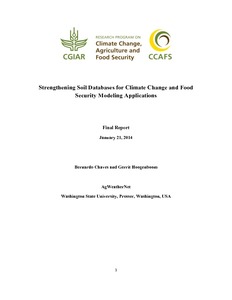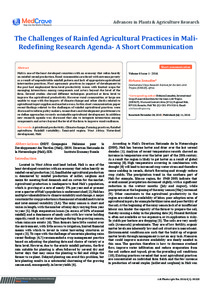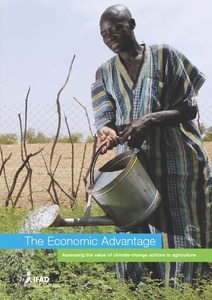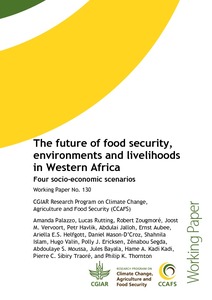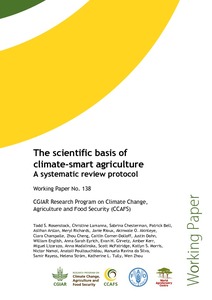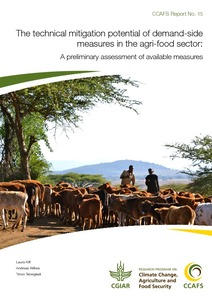Cambio climático
AGROVOC URI:
Strengthening Soil Databases for Climate Change and Food Security Modeling Applications
Climate change is a hazard to the food security of a growing world population since it affects agriculture and likewise, agriculture and natural resource management affect the climate system. The relationships between all these factors including polices, political conditions, economical management and pest and diseases, and how they interact are not currently well-understood, nor are the advantages and disadvantages of different responses to climate change.
Surface organic carbon enrichment to explain greater CO2 emissions from short-term no-tilled soils.
The impact of agricultural practices on CO2 emissions from soils needs to be understood and quantified to enhance ecosystem functions, especially the ability of soils to sequester atmospheric carbon (C), while enhancing food and biomass production. The objective of this study was to assess CO2 emissions in the soil surface following tillage abandonment and to investigate some of the underlying soil physical, chemical and biological controls.
Tanzania Summary of Baseline Studies: Country Report for the GFCS Adaptation Program in Africa
This report reflects upon the consolidated findings from the baseline and scoping studies conducted under the auspices of Global Framework for Climate Services (GFCS) Adaptation Programme in Africa. It identifies gaps in climate information access and use at the local level, type of climate services farmers and pastoralists need in Tanzania, relevant channels to reach farmers with requested services, lead-time and gender specific requirements.
The challenges of rainfed agricultural practices in Mali-redefining research agenda - A short communication
Mali is one of the least developed countries with an economy that relies heavily on rainfed cereal production. Rural communities are faced with extreme poverty as a result of unpredictable rainfall pattern and lack of appropriate agricultural intervention practices. Most agronomic practices in support of development in the past had emphasized farm-level productivity issues with limited scope for managing interactions among components and actors beyond the level of the farm. Several studies showed different techniques practiced at farm level to improve the agricultural productivity.
The Economic Advantage: Assessing the value of climate-change actions in agriculture
This report is aimed at readers who seek to build economic evidence in support of the inclusion of actions on agriculture in climate change plans and programmes, particularly at the national level under the umbrella of nationally determined contributions (NDCs) to the December 2015 Paris Agreement, which aims to restrict a rise in global temperatures and manage risks.
The future of food security, environments and livelihoods in Western Africa: Four socio-economic scenarios
This working paper examines the development of regional socioeconomic scenarios for West Africa’s development, agriculture, food security and climate impacts. We present four globally consistent regional scenarios framed and outlined by regional experts who crafted narratives and determined key drivers of change. Stakeholders identified the type of actors driving change and the timeline of strategic planning as the most uncertain and most relevant factors of change affecting food security, livelihoods and environments in the region.
The impact of investment in smallholder irrigation schemes on irrigation expansion and crop productivity in Malawi
Reliance on rainfall for agriculture and increased climate change and variability pose growing production risks in developing countries. Agriculture in Sub-Saharan Africa is dominated by smallholder farmers who depend mainly on rain-fed agriculture, putting food security at both household and national levels at risk, especially in the event of drought. Investment in smallholder irrigation becomes a priority in developing countries if food security and national development goals are to be met, as their economies are agro-based.
The potential role of neglected and underutilised crop species as future crops under water scarce conditions in sub-Saharan Africa.
Modern agricultural systems that promote cultivation of a very limited number of crop species have relegated indigenous crops to the status of neglected and underutilised crop species (NUCS). The complex interactions of water scarcity associated with climate change and variability in sub-Saharan Africa (SSA), and population pressure require innovative strategies to address food insecurity and undernourishment. Current research efforts have identified NUCS as having potential to reduce food and nutrition insecurity, particularly for resource poor households in SSA.
The scientific basis of climate-smart agriculture: A systematic review protocol
Background: ‘Climate-smart agriculture’ (CSA)—agriculture and food systems that
sustainably increase food production, improve resilience (or adaptive capacity) of farming
systems, and mitigate climate change when possible—has quickly been integrated into the
global development agenda. However, the empirical evidence base for CSA has not been
assembled, complicating the transition from CSA concept to concrete actions, and
contributing to ideological disagreement among development practitioners. Thus, there is an
The technical mitigation potential of demand-side measures in the agri-food sector: a preliminary assessment of available measures
A number of studies have suggested that addressing greenhouse gas (GHG) emissions from agricultural
production, or ‘supply-side emissions’, will be insufficient to reduce agri-food sector GHG emissions to limit
the increase of global temperatures to well below 2o
C. Recent studies have also suggested that ‘demandside
measures’ related to food consumption, food value chains, and food loss and waste, will be necessary
to reduce emissions and may have a larger technical mitigation potential than supply-side measures.


